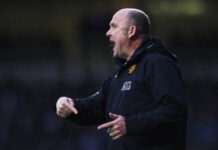[ad_1]
LONDON — Gareth Southgate’s eight-year tenure as manager of the England men’s national team delivered the most consistent tournament performances in the country’s history, yet he was chased out of the job by people demanding something more.
Southgate guided England to a semifinal, final, quarterfinal and another final from his four attempts to end the Three Lions’ wait for a major trophy. They reached back-to-back Euros finals for the first time ever. He won 61 of his 102 matches and secured nine tournament knockout wins, more than every other manager combined since England’s World Cup win in 1966. Yet the expectation that built up during this period of resurgence ultimately consumed him.
Inheriting a flawed, shallow squad, plus a broken relationship between fans and players and a group weighed heavy by the responsibility of playing for England, Southgate changed everything. They arrived at Euro 2024 expected to win and win well. But they reached the final relying on moments rather than dominance, and fan opprobrium at a team performing at a level lower than the sum of their parts turned up the heat on the manager.
Among the widespread dissenting voices, there was no consensus on who should come next, only that someone should. Beer cups were thrown at Southgate, thousands of fans booed his team and former England captain Gary Lineker described one England performance as “s—.”
Southgate, as attuned to the world around him as he always has been, duly stepped aside two days after England’s defeat to Spain in the final. Three weeks later the Football Association (FA), who would have been happy for Southgate to continue through to 2026, confirmed that Lee Carsley would take charge on an interim basis until a permanent manager could be found.
Carsley, 50, stepped up from his role in charge of the under-21s, who he guided to success at last year’s U21 Euros — ironically, against Spain. He will be in charge for England’s six UEFA Nations League matches throughout the autumn unless a permanent appointment is made before then.
Those fans and critics who clamoured for change have got it. So how have England fared in these first tentative steps into the post-Southgate era?
Carsley goes from caretaker to contender
Carsley began this camp by describing himself as a “safe pair of hands” in an uncertain period for the FA. The search for Southgate’s successor will be undertaken by technical director John McDermott, overseen by chief executive Mark Bullingham and chair Debbie Hewitt. None of the trio were in post when Southgate was appointed in 2016 and therefore there is no experience within the FA’s executive of making such a seismic decision in the men’s game.
Carsley may largely be an unknown figure outside of England but there is logic behind his transition into a genuine candidate after sealing two UEFA Nations League wins against Republic of Ireland and Finland. Firstly, he is following the same path trodden by Southgate himself in 2016, stepping up from managing England’s U21s to the senior setup. Secondly, Luis de la Fuente and Lionel Scaloni won two of the most recent major tournaments for Spain (Euro 2024) and Argentina (2022 World Cup) respectively despite their previously modest coaching records, suggesting Carsley’s minimal past experience in temporary charge of Coventry City, Brentford and Birmingham City is not an impossible obstacle to taking the job permanently.
The more games he wins, the harder it will be to look elsewhere. There are, however, other candidates. Eddie Howe’s frustrations at Newcastle United’s lack of transfer activity have raised the possibility he could become available. Sources have told ESPN that Graham Potter was viewed as a potential successor to Southgate prior to his disappointing seven-month spell at Chelsea, which culminated in his sacking in April 2023. Former players Frank Lampard and Steven Gerrard would likely jump at the chance, while the more ambitious supporter would point to the possibility of Pep Guardiola leaving Manchester City when his contract expires next summer. Guardiola is also on record stating he would love to try international management and will never manage Spain given his proud Catalan heritage.
But while Carsley has continued to play down his prospects, two solid performances with a refreshing feel makes it a little more possible for him to bridge the gap between his past achievements and the size of the vacancy before him.
Has England’s style improved?
“You want to stand at the side of the pitch, enjoying watching the team play,” Carsley said after Tuesday’s 2-0 win over Finland at Wembley. Many fans in the stands would agree with him. Among the leading criticism of Southgate’s England, particularly since the 2022 World Cup, has been quite simply that they haven’t been great to watch.
At Euro 2024, England played well for the first half an hour of their group stage opener against Serbia and for 45 minutes against Netherlands in their semifinal. The rest was an almighty struggle despite possessing a wealth of individual attacking talent.
Carsley has not had much time to work with these players but he leant on his knowledge of the U21s by calling up players such as Morgan Gibbs-White, Angel Gomes, Rico Lewis and Noni Madueke. He handed two starts to Anthony Gordon — given just one minute of game time at the Euros — and recalled Jack Grealish after he was left out of the squad altogether. Carsley also did something else Southgate was reluctant to do and selected Trent Alexander-Arnold for both games at right-back. Alexander-Arnold was the subject of a midfield experiment at the Euros, which Southgate was forced to admit had failed by the end of the group stage.
The results for Carsley were encouraging. According to Stats Perform, England had an expected goals figure of 2.41 for Saturday’s 2-0 win in Ireland, higher than any match at the Euros and all but four games since the 2022 World Cup. Against Finland, England recorded 801 passes, the highest total by any team in a single match in the 2024-25 Nations League so far. They only registered a higher number of passes attempted in two games since the last World Cup.
Collectively, there were exciting, dynamic patterns of play, particularly in the first half against Ireland and the second against Finland. Notably, goalkeeper Jordan Pickford was less direct in his distribution as England tried to play out even more from the back.
Of equal significance, many of Carsley’s individual calls paid off. Grealish thrived in a No. 10 role against Ireland. Nobody had more touches on the pitch than Gomes’ 130 against Finland as he brought a fresh approach to England’s longstanding problem of finding balance in midfield. Gordon was a livewire and Alexander-Arnold was able to affect the game in attacking areas while maintaining a defensive presence.
Carsley opted not to alter the leadership group most recently reshuffled by Southgate prior to Euro 2024. That group contained Harry Kane as captain and Kyle Walker as vice-captain, plus Jude Bellingham and Declan Rice. With Bellingham and Walker absent, Carsley could have made changes but he chose not to tinker with the hierarchy. This led to a moment of confusion in Dublin when Kane went to give Rice the armband upon his late substitution, only for the Arsenal midfielder to pass it to John Stones, who was coming on at that time. Stones took the armband for the final five minutes.
“Kane tried to give me the armband but Stonesy is more senior and experienced than me,” Rice explained after the game. “I just said to Harry, ‘Probably John deserves it more than me. I said to give it to John.'”
Kane led from the front, however, starting both games and taking charge off the field by putting himself up for both prematch news conferences to stand alongside the interim boss. He marked his 100th cap against Finland in fine style with two excellent finishes while wearing a pair of golden boots, quietening the doubters over his recent form.
The level of opposition was modest, but England have sometimes laboured in similar games. And if Carsley’s coaching pedigree is one of the biggest question marks, then imposing tangible — if not dramatic — changes to England’s style so quickly is a promising start.
The new statesman
Southgate was an excellent communicator who used empathy and diplomacy to navigate the off-pitch minefield every England manager is asked to walk through.
Rightly or wrongly, the post comes with an expectation of comment on the issues that often transcend their immediate responsibilities or even football itself. Whether he faced questions on tensions between the west and Russia, the war in Ukraine, COVID-19, human rights controversies in Qatar or racism, Southgate answered thoughtfully and thoroughly in a manner that made him a fine ambassador but clearly also began to drain him as time wore on.
Carsley had big shoes to fill in this regard and there were a few missteps. A row broke out on the eve of his first game over his decision not to sing the English national anthem. Facing Republic of Ireland, the nation he made 40 appearances for after being born in Birmingham with an Irish grandmother, this stance was particularly awkward given the rivalry with England.
The FA’s position was that it should be a personal choice. Carsley insisted he had never sung any anthem — as a player or while England U21 manager — because he chose to use the time immediately before kick off to focus on the first actions in the game. A backlash in some parts of the media followed — considered overblown by many — but the furore threatened to overshadow his start, and things got worse when he walked out at Aviva Stadium and sat in the Irish dugout momentarily before being redirected.
Although he kept the relaxed feel that Southgate engendered, he was more hands-on as a coach in the minutiae, dressed in a tracksuit for both games and putting out cones for the warmup in a manner a more experienced manager may have delegated. He also clutched an iPad at times — a departure from Southgate’s pen and paper — to remind himself of “a lot of notes from before the game on shapes the opposition might do.”
Carsley’s body language on the touchline was much more engaged than Southgate’s, although how much significance to attach to that is debatable. But while his predecessor would often stand, hands in pockets with one leg stretched out watching on, Carsley would crouch right by the touchline looking every inch the coach rather than the manager.
Away from the cameras, Carsley spoke to the players at St George’s Park about the idea of their legacy and how they wanted to be remembered as England players. In front of the media, he handled his duties well in the main, without being anything like the orator Southgate is. Thankfully, the quality of the football rendered that a footnote. Carsley may not have sung the anthem at the beginning in Dublin but the England fans sang it triumphantly at the end and, really, that’s all that should matter.
[ad_2]











